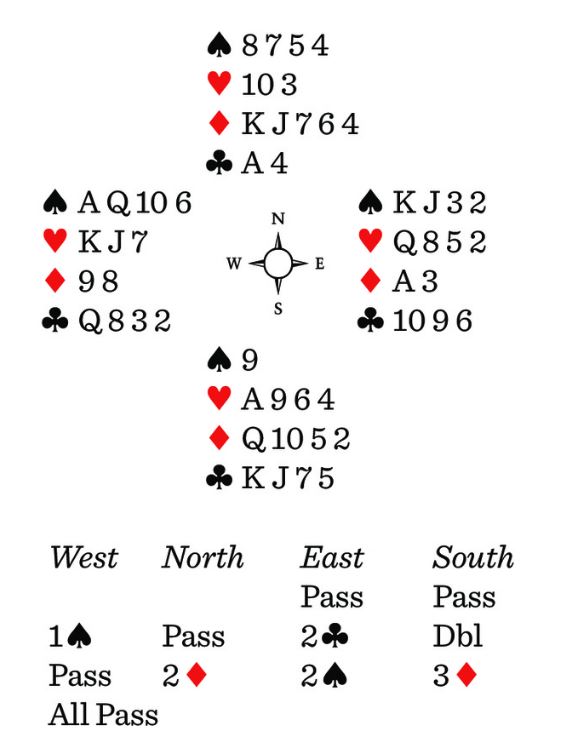Source: June 2016 ACBL Bridge Bulletin 



Many players use Drury, an excellent convention. This article will discuss an aspect of Drury that doesn’t get discussed much. It occurs when your opponents use Drury.

West opens 1

in third seat, and East, who passed originally, bids 2

, Drury. This typically shows three or four spades and 10 or so support points. What does it mean in your methods if you double 2

? There are two main treatments in use:
1) You have good clubs and want partner to lead them when the bidding is over.

You would like a club lead, and you show that by doubling 2

.
2) You want to make a takeout double of their major. If you double 2

, you are showing something like this:

If your partner has a decent hand with a decent suit, he can compete. The hand might actually belong to your side. My guess is that 65% use double to show clubs and 35% use double as takeout. This strikes me as an error because asking for a club lead is a narrow target whereas doubling for takeout gets you involved in quite a few deals.
When you double 2

for takeout, your partner is asked to bid. If opener passes, your partner can bid at the two level. Here is the trick I am advocating: Play that if your partner bids a suit, he is showing a decent hand, but that if your partner has a lousy hand, he just passes 2

doubled. The opponents aren’t going to play in 2

doubled. They will always bid their major. What would you call with each of the following example hands?

Pass, showing a bad hand.

Pass showing a bad hand. 2

promises more than this.

2

showing a useful hand. The reason this agreement is useful is that when the opponents keep bidding, as they always do, your partner will know you have something, and he can continue if he wishes.

3

, showing quite a good hand. You have an excellent suit, a useful king, a singleton club and a huge likelihood that partner has a singleton spade. If partner has maximum values for his double, you could have a game in spite of his having passed earlier.

Pass. You don’t really want to bid anything. Yes, you have 8 HCP and two suits, but your values, facing a passed hand, are not that great.

Bid 3

. You have a five-card suit and modest values, easily enough to bid at the three level. Why pass and let the next player bid 2
 ,
, and then spend time wondering if you should bid 3

over that?
Here is a layout showing how this agreement can benefit you.

South makes his takeout double and West passes. North bids 2

, which promises some values. Now when East bids 2

, South can raise to 3

based on his excellent shape.
Don’t forget to follow us @
 West opens 1
West opens 1 South makes his takeout double and West passes. North bids 2
South makes his takeout double and West passes. North bids 2 West opens 1
West opens 1 South makes his takeout double and West passes. North bids 2
South makes his takeout double and West passes. North bids 2